Labour could be in power very soon. What would that mean for Greater Manchester?
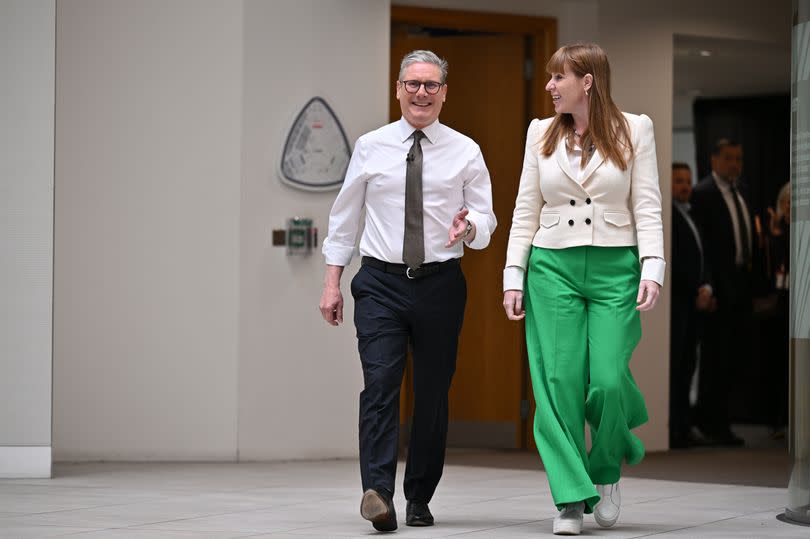
With the general election just a few days away, the Labour Party looks poised to form the next government. Polls give the party which has been out of power for 14 years a 20 point lead, with some pollsters predicting Labour could win a landslide majority.
And while things could change between now and polling day on July 4, the party has promised to 'hit the ground running' if they win. The Manchester Evening News has been speaking to senior party figures over the last few months to find out what their plans are.
Several members of Labour's top team have served as opposition MPs in Greater Manchester. This includes deputy leader Angela Rayner, shadow business and trade secretary Jonathan Reynolds and shadow House of Commons leader Lucy Powell.
HAVE YOUR SAY: The Greater Manchester General Election 2024 Survey
Within days, they could all be in government. Labour leader Sir Keir Starmer says these frontbenchers and other shadow ministers from Greater Manchester will be 'powerful advocates' for the city-region and has promised to work closely with mayor Andy Burnham.
But what are Labour actually planning to do in power? The M.E.N has looked into the party's policies on housing, transport, health, devolution, the cost of living and the environment to find out what a Labour government would mean for Greater Manchester.
Housing
Labour has promised to build 1.5m new homes over the next Parliament. This equals the target set by the Conservatives who have previously promised 300,000 new homes a year - but over the last 10 years the average annual number of new homes was 207,000.
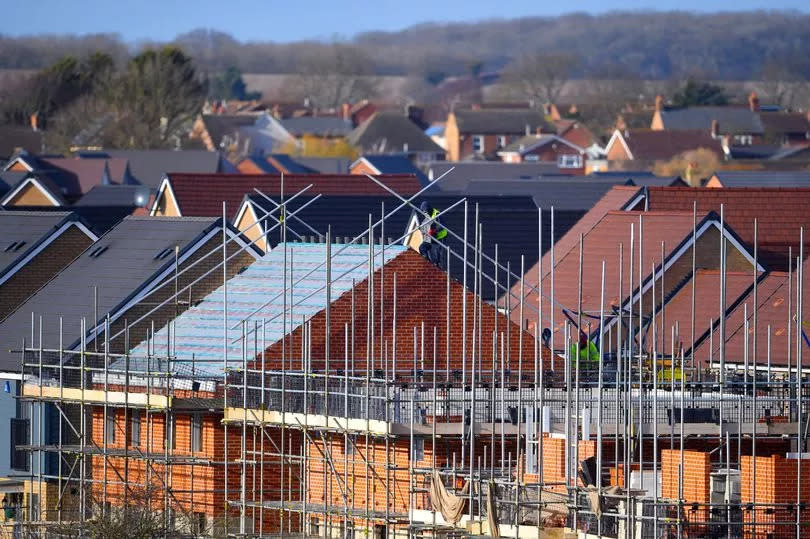
Labour says it would immediately update planning laws and reinstate mandatory housing targets, with plans for a 'generation' of new towns across the UK. But the party is yet to say how many homes would be built in each area and where these 'new towns' would be.
Last year, Ms Rayner promised the 'biggest boost in affordable and social housing for a generation'. But, speaking to the M.E.N in March, the deputy leader - who is also the shadow levelling up, housing and communities secretary - could not put a number to it.
She said that Labour would 'unblock' funding for housing and 'free up' big infrastructure projects that are being held back. Labour has also said that it will give metro mayors new powers over planning, allowing them to set 'strategic planning policies' for their areas.
What this means in practice remains unclear, with the party's general election manifesto failing to explain exactly how it will work. The 133-document says that Labour will require mayors and combined authorities to 'strategically plan for housing growth in their areas'.
Greater Manchester already has a joint development plan, with nine of our ten councils approving the plan this year after a decade-long saga. Mr Burnham promised to radically rewrite the controversial proposal to build on green belt land when he was first elected.

But the final decision fell to local councils with all but one - Stockport - deciding to go ahead. With a plan now agreed, it is not clear what Labour's offer of new 'strategic planning' powers would mean for Greater Manchester and what it would allow the mayor to do.
Speaking to the M.E.N in March, Mr Reynolds, who is standing for re-election as the Labour MP for Stalybridge and Hyde, was asked who should be making decisions over big infrastructure projects. He said: "I think we'd be very much of the view that where you've got an elected mayor with the mandate and the authority, they are the right person. Most countries operate a system like that."
Transport
Labour has been critical of the Conservatives' handling of transport projects too. However, in January, a few months after Rishi Sunak cancelled the Northern leg of HS2, Labour's leader told the M.E.N he would not be reviving plans for a new high-speed line to London.
As it stands, HS2 will end in the West Midlands with trains set to join the existing West Coast Mainline from there. But Mr Burnham, who has been working with private companies on an alternative plan, argues that a new line is still needed - even if it's not high-speed.
Speaking to the M.E.N during the election campaign, Labour's shadow transport secretary Louise Haigh said that, while the party will not take the previous HS2 plans 'back off the shelf', there are 'lots of options on the table' including Mr Burnham's alternative proposal.
However, Ms Haigh would not commit to any specific transport schemes. This includes the new Northern Powerhouse Rail line from Manchester to Liverpool which the Conservatives promised the mayors of the two city-regions after they cancelled phase 2 of HS2.
Sir Keir told the M.E.N during a visit to the North West in May that he is already talking to the mayors about the plan. But a major rail project was not mentioned in Labour's manifesto with Ms Haigh saying the party will not promise anything they cannot commit to.
Nonetheless, Labour has not ruled anything out - including plans for two new platforms at Piccadilly which were scrapped last year. Asked about this, Ms Haigh said: "Absolutely, that will be considered as an option because it is one of the biggest barriers to growth."
It comes as the party awaits the findings of an independent expert-led review into rail and urban transport infrastructure. Ahead of its publication, Labour has said it will aim to deliver new transport projects 25 per cent faster and 20 per cent cheaper than existing ones.
Labour has also promised that all local transport authorities will be allowed to bring their buses under public control and 'explore' how they can integrate them with trains, following London's lead. But in Greater Manchester, the new Bee Network is doing just that.
Last September, Greater Manchester became the first place outside of the capital to bring buses under public control since the 1980s. Under the new franchising system, private companies bid for contracts to run bus services while local leaders set fares and routes.
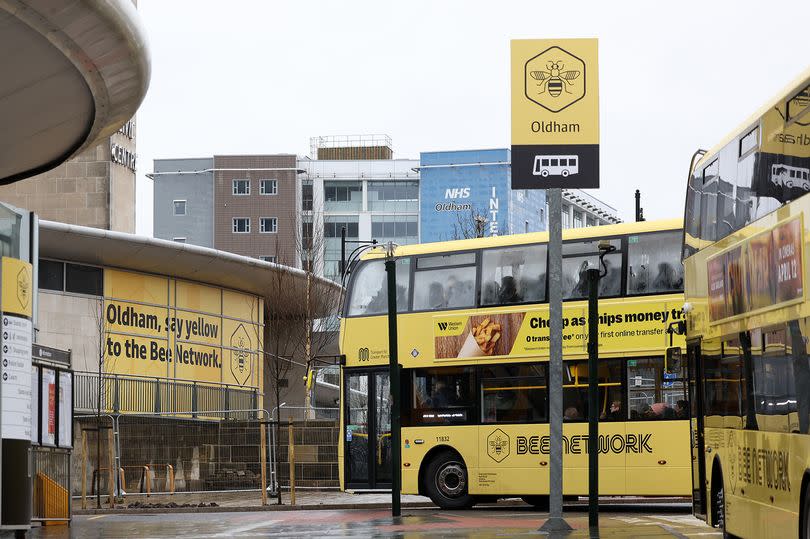
And, earlier this year, the government announced the first step towards bringing rail services into the new Bee Network as well with a 'pay as you go' trial allowing passengers to tap-in and tap-out on two train lines from 2025. By the end of the decade, the plan is to introduce a daily cap on fares for buses, trams and trains, bringing them all under one integrated London-style transport system.
Like Labour, the Conservatives have said they want to see other parts of the country follow Greater Manchester's lead on buses. But there is one difference in Labour's offer - that its deputy leader announced in March - which could see the city-region go even further.
Labour has said it would scrap the 'ideological' ban on publicly-owned bus companies. This means that, under a Labour government, local leaders would not have to rely on private companies to run buses - public bodies would be allowed to run services themselves.
Under the Bee Network, many stations and some buses are now publicly owned. Mr Burnham has said that having a publicly-owned bus company in the mix would create more competition when operators bid for contracts, bringing with it better value for money.
Ms Haigh also said that she would expand the Department of Transport's light rail team. She hopes this will help boost tram services.
Labour has also promised to fix 1m additional potholes a year. This would be funded by delaying the A27 bypass on the south coast.
Health
Labour has warned of a 'challenging' winter ahead in the NHS - even if they win the general election this week. But shadow health secretary Wes Streeting has promised that 40,000 extra appointments will be available 'well within a year' of a Labour government.
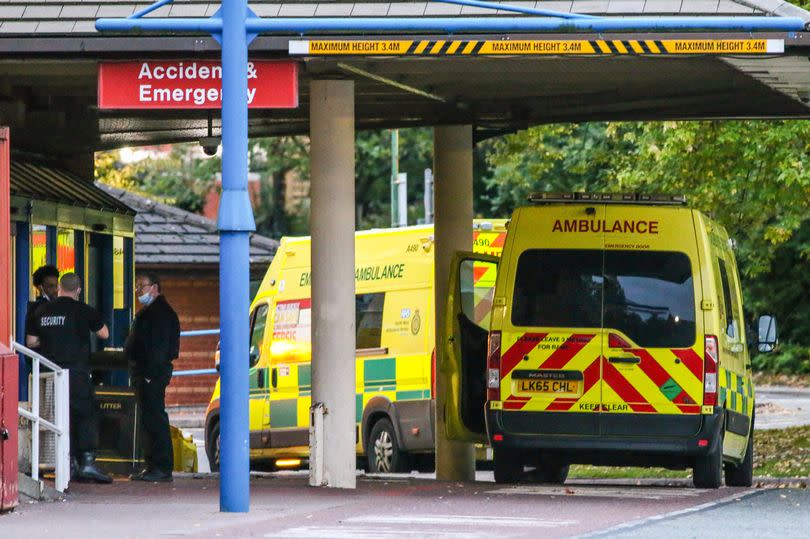
The party has promised to cut NHS waiting times by creating these new appointments on evenings and weekends which would be paid for by cracking down on tax avoidance and closing loopholes. The manifesto says that it will create these extra appointments by 'incentivising' staff to work more out of hours and pool resources across neighbouring hospitals to introduce shared waiting lists.
Labour has also promised to reform social care by creating a 'National Care Service'. The party has also promised to develop 'local partnership working' between the NHS and social care to make sure people are not stuck in hospital for longer than they need to be.
Speaking to the M.E.N during the campaign, Mr Streeting said that Labour will 'hit the ground running' if they win, but warned that the party cannot 'fix all of the problems' in the next six months. It comes as the NHS is set for another difficult winter when demand rises.
The Labour frontbencher said improving the NHS will help stem the flow of staff leaving the work elsewhere. But he said the party is 'willing to negotiate' and 'work together' with junior doctors - who are currently on strike again - over their pay, terms and conditions.
Mr Streeting, who has served as an MP in London since 2015, said Labour will make sure the ambitious rebuild of North Manchester General Hospital is completed. But he said he will need to have 'full and frank' conversations to make sure the 2030 deadline is met.
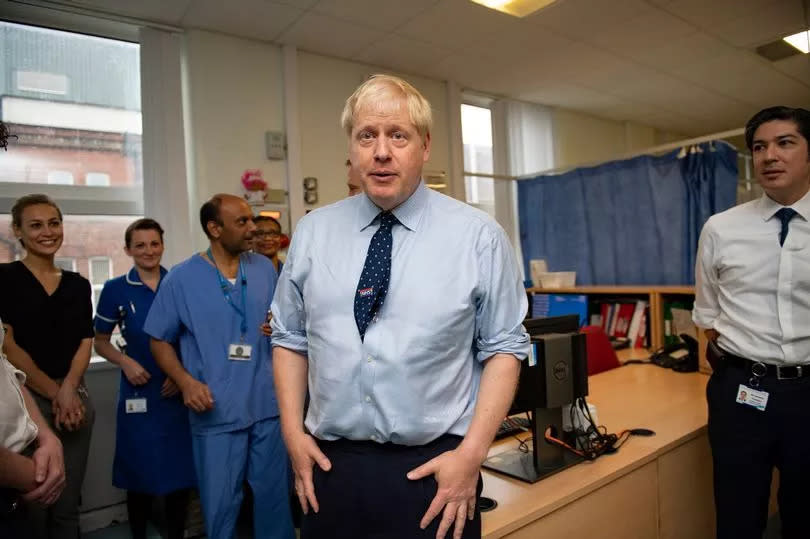
The shadow health secretary also promised to look at whether NHS budgets can be spent better to fix other hospitals in the region. It comes after Stepping Hill Hospital in Stockport saw one of its outpatients buildings condemned and two ceilings collapse this year.
Dangerous crumbling concrete known as RAAC has also been identified at five hospitals in Greater Manchester. Earlier this year, the Royal Bolton Hospital had to move some of its maternity services on the site and relocate its women’s healthcare services elsewhere.
Asked how Labour would fix Greater Manchester's hospitals, Mr Streeting said: "We are looking at the wider NHS capital budget and how we can use it to best effect. Not just propping things up, but actually delivering the fundamental improvements that are needed."
Poverty
Labour has promised a 'new deal for working people' which would ban exploitative zero hour contracts, end fire and rehire and introduce basic rights to parental leave, sick pay and protection from unfair dismissal. They say this will make 'work pay' arguing that, currently, for many people in the UK, a job does not offer a route out of poverty, either because work is insecure, inflexible or low paid.
The manifesto also says that it is committed to reviewing Universal Credit so that it 'makes work pay and tackles poverty'. The Labour Party also says it wants to end 'mass dependence' on emergency food parcels, which it describes as a 'moral scar on our society'.
In the Labour manifesto, the party boasts that the last Labour government lifted more than half a million children and over a million pensioners out of poverty. It says the next Labour government would build on that legacy of 'pursuing opportunity and social justice'.
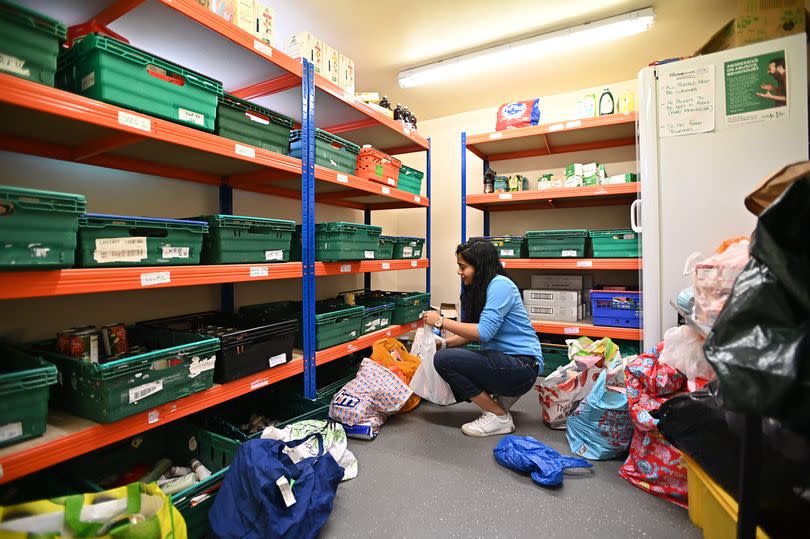
However, controversially, the party has said it would not reverse the two-child cap on benefits which was introduced by the Tories in 2017. It comes as child poverty has gone up by 700,000 under the Conservatives with one million children currently facing destitution.
In some parts of Greater Manchester, more than half of children are living in poverty with Oldham, Bolton and Blackley topping the list. In Manchester alone, the Trussell Trust network of food banks handed out 31,000 food parcels last year, up from 12,000 in 2017/8.
Graham Whitham, who is the CEO of Resolve Poverty - formerly known as Greater Manchester Poverty Action - has described the two-child limit policy as 'cruel'. However, he is 'optimistic' about child poverty being a focus of an incoming Labour government.
He points to the party's manifesto pledge to enact the socio-economic duty in the Equality Act of 2010. This part of the law requires public bodies to take the reduction of inequalities which result from socio-economic disadvantage into account when making policies.
However, Mr Whitham said that what has been lacking over the last 14 years under the Tories has been a national strategy to tackle child poverty. He said: "At a national level, if you want to address child poverty, you're going to have to pull some big levers.
"The two-child limit policy and the value of Universal Credit. You're going to have to put your money where your mouth is."

The Labour manifesto says it will develop an 'ambitious strategy' to reduce child poverty. The party promises to work with the voluntary sector, faith organisations, businesses, devolved and local government and communities to bring about this change.
The party has also committed to recruiting 6,500 new teachers in key subjects to 'prepare children for life, work and the future'. This would be paid for by ending tax breaks for private schools which is expected to raise around £1.5bn, according to the manifesto.
This money would also be spent on opening 3,000 new nurseries - by upgrading space in primary school - and on mental health support for every school. The party also plans to introduce a supervised tooth-brushing scheme, targeting areas of highest need.
Crime
The Labour Party manifesto promises to halve serious violent crime, pledging to halve knife crime and violence against women and girls within a decade. The party also says it wants to raise confidence in the police and criminal justice system to its 'highest levels'.
Labour promises to restore neighbourhood policing with 'thousands' of extra officers, equipped with the powers they need. These new recruits would be paid for by tackling waste through a new programme which would see services shared across police forces.
The party says it would give inspectors new powers to intervene in failing police forces. It comes nearly four years after Greater Manchester Police was placed in special measures after inspectors found the force was failing to record one in four violent crimes.
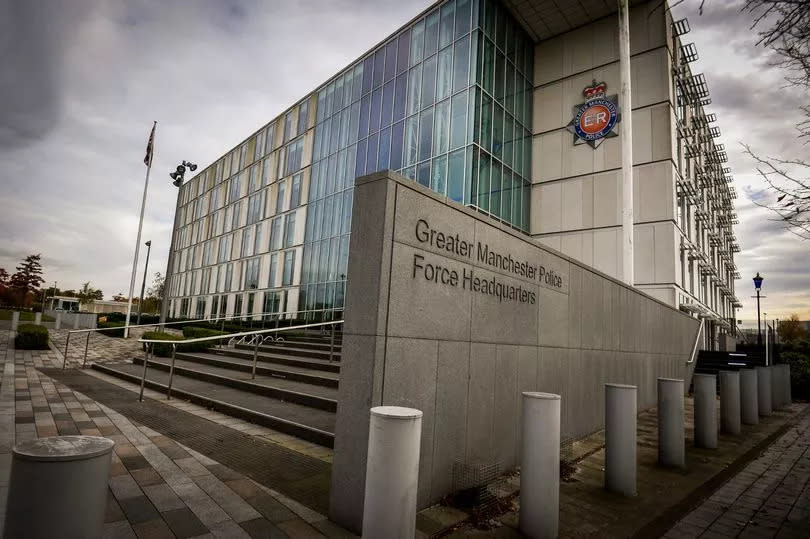
Last year, a few months after GMP was lifted out of special measures, the M.E.N revealed that almost 100 police officers were under investigation for sexual misconduct. Labour now says it would introduce mandatory professional standards on vetting, checks and misconduct for officers and bar anyone with a history of violence against women and girls would be barred from serving in the police.
Labour has also promised to introduce new 'respect orders' which would ban persistent adult offenders from town centres to 'stamp out' public drinking and drug use. Fly-tippers and vandals would also be 'forced' to clean up the mess they create, the party has said.
The party would also scrap the 'effective immunity' for shoplifting and create a new specific offence for assaults on shop workers that will protect them from threats and violence. The party pledges to drive up the proportion of crimes solved by cutting bureaucracy.
Earlier this year, during a visit to the M.E.N offices, students from Oldham's Newman RC College, Rochdale College and Manchester Academy told Sir Keir that they feel unsafe walking home because of the threat of knife crime. The Labour leader told the students that Labour would 'get tough on crime, get tough on the causes of crime' while suggesting that zombie knives should be banned.
Labour has now committed to halving knife crime in a decade. The manifesto says that every young person caught with a knife would receive a mandatory plan to prevent reoffending with penalties including curfews, tagging and custody for the most serious cases.
The party would also ban ninja swords, zombie-style blades and machetes and strengthen rules to prevent online sales. According to the manifesto, Labour would hold executives at companies cashing in on knife crime personally accountable with 'tough sanctions'.

Youth workers and mentors would be placed in A&E units, Pupil Referral Units and at new 'Young Futures' hubs where mental health support workers and careers advisers would also be based. There would also be a new offence for the criminal exploitation of children.
The party says it also wants to halve violence against women and girls in a decade by setting up specialist rape and sexual offences teams in every police force. According to the manifesto, under Labour, the most prolific and harmful perpetrators will be 'relentlessly targeted' using tactics normally reserved for terrorists and organised crime with rape cases fast-tracked in specialist courts.
Labour says it would ensure that schools address misogyny and teach young people about healthy relationships and consent. The Labour manifesto has committed to strengthening Stalking Protection Orders and introducing a new criminal offence for spiking too.
The M.E.N has reported on a number of spiking cases - either by drink or injection - that have occurred in Greater Manchester in recent years. in 2021, hundreds of people gathered in St Peter's Square in support of a national boycott of nightclubs which Greater Manchester mayor Andy Burnham attended. It followed reports of young women in Fallowfield and the city centre being spiked.
Labour has also promised to reduce re-offending by working with prisons and linking them up with local employers and the voluntary sector to get ex-offenders into work. In the manifesto, the party promises to conduct a strategic review of probation services, citing Greater Manchester as an example of an area pioneering a new model where probation is linked up with housing and health services.
The party has also promised to 'smash the criminal boat gangs' that smuggle migrants across the Channel. Labour has promised to set up a new Border Security Command staffed by hundreds of new investigators, intelligence officers and cross-border police officers.
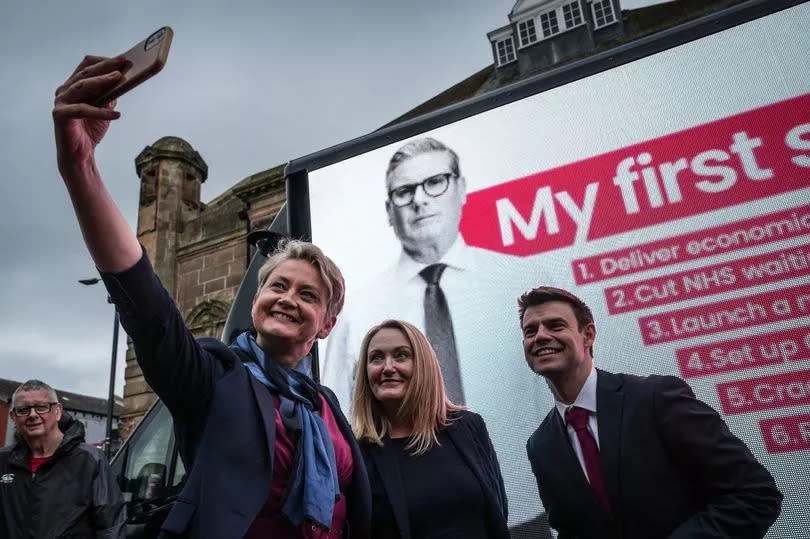
This would be funded by ending the Tories' plans to send some asylum seekers to Rwanda. The new border unit would be supported by new counter-terrorism style powers to pursue, disrupt and arrest those responsible for the small boats crossing, the manifesto says.
One week before the general election was called, the M.E.N asked Labour's shadow home secretary Yvette Cooper about her party's plans to fix the asylum system which has left refugees sleeping rough on the streets of Greater Manchester. She said that the 'chaotic' and 'broken' system needs reform 'from beginning to end' and promised to work with local councils as it clears the backlog of claims.
The M.E.N asked Ms Cooper how Labour will make sure refugees do not end up sleeping on the streets once their asylum claim is approved, as they have been in Greater Manchester. She said: "Every bit of the system isn't working and that's why what we need is a proper plan. Instead of the gimmicks, actually just getting a grip of the system and having those proper partnerships working in place."
Environment
Labour had previously promised to invest £28bn a year on green projects. But earlier this year, the party rowed back on this pledge.
The Green Prosperity Plan promises to create 650,000 jobs across the country by 2030 by working in partnership with business and drawing on a 'National Wealth Fund' which will be worth £7.3bn over the course of the next Parliament. This would partly be paid for through a windfall tax on oil and gas giants which would raise £1.2bn and by borrowing £3.5bn to 'leverage private investment'.
Labour will also create a new publicly-owned company called Great British Energy which would invest in 'clean home-grown' power. The party promises to deliver clean power by 2030 by doubling onshore wind, tripling solar power and quadrupling offshore wind.
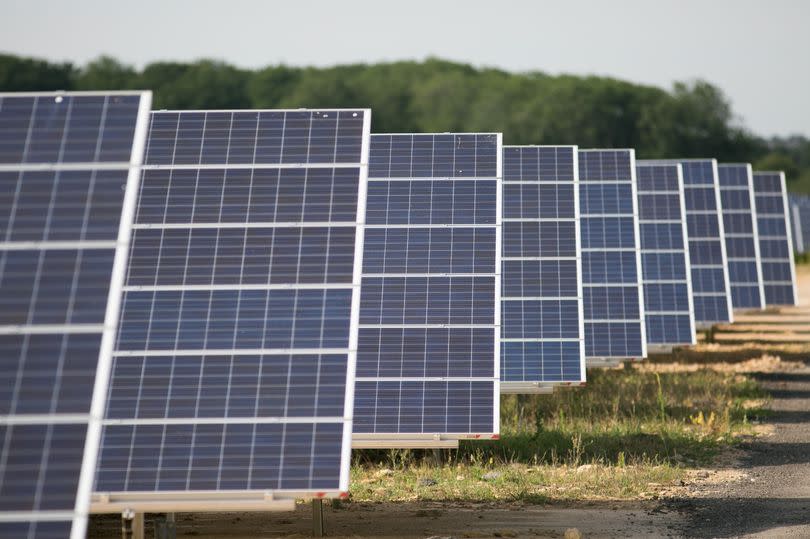
The manifesto also commits to investing in home insulation upgrades. It says this will save families hundreds of pounds on their bills.
The party has said it will 'accelerate' the drive to achieve net zero carbon targets. However, when it comes to road pollution, Labour has insisted it is 'on the side of drivers', with the party's leader promising not to mandate Clean Air Zones that charge motorists.
It comes after local leaders in Greater Manchester put forward a plan to scrap all charges on motorists under the controversial scheme which has been under review for two and a half years. They previously backed the scheme which would have charged vans, taxis, buses and lorries that don't meet emissions standards a daily penalty but argue this is not needed to bring pollution below legal limits.
However, the government must approve the new plan which involves funding upgrades for certain vehicles. Speaking to the M.E.N during the election campaign, Sir Keir said that Greater Manchester would not need to introduce a Clean Air Zone if Labour wins.
He said: "It's not going to be mandated. It's a matter for locally elected representatives. But Andy Burnham's doing a good job. He's come up with his plan which is good because it doesn't disproportionately impact on motorists."
Devolution
When Labour leader Sir Keir Starmer visited the Manchester Evening News office in January, he promised that more powers would be devolved to Greater Manchester under his government. But the details, he said, were still being discussed with mayor Andy Burnham.
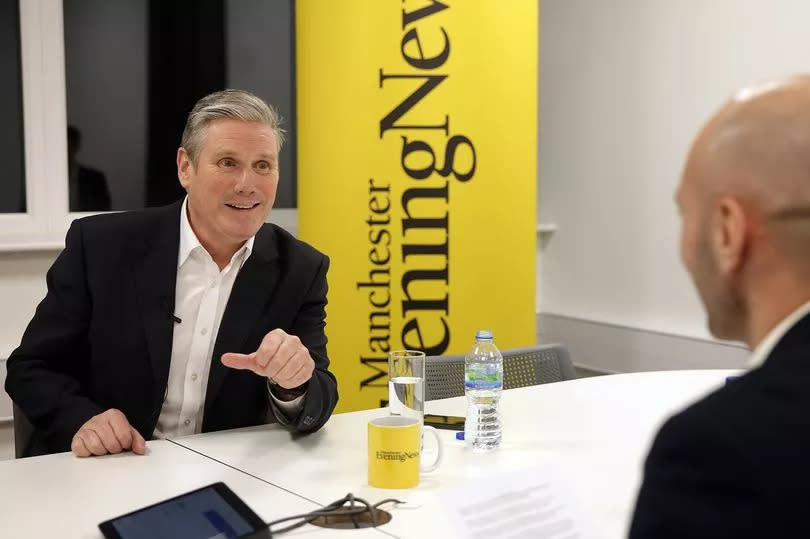
Speaking to the M.E.N in March, Mr Burnham said that he is 'encouraged' by the conversations he has had with his party so far - but he made it clear that he will be 'pressing for more'. Promises of bringing railways into the city-region's public transport network and helping local leaders build more social housing were two 'solid things' giving the Greater Manchester mayor 'great encouragement'.
Labour's manifesto commits to transferring power out of Westminster and giving regional mayors more power over transport, adult education and skills, housing and planning, and employment support. Metro mayors would also be given more flexibility over finances.
Last year, Greater Manchester's leaders signed a new 'trailblazer' deal, giving Mr Burnham a simpler, more flexible funding deal. The single settlement means that the Greater Manchester Combined Authority (GMCA) will be funded like government departments are.
Starting in Greater Manchester and the West Midlands from next year, the government has said that it intends to roll out this model in other areas represented by mayors in the future. In March, Labour confirmed it would give mayors across the country the same deal.
But while combined authorities can look forward to more financial freedom, local councils are struggling to make it from one year to the next. According to the Local Government Association, councils in England face a £6.2bn funding gap over the next two years.
This year alone, Greater Manchester's 10 councils have had to cut nearly £100m and raise council tax by 5 per cent just to balance the books. However, Labour has not committed to giving councils more money, instead promising to give them long-term funding deals.
Ms Rayner told the M.E.N in March that other measures, such as ending no-fault evictions in private rented housing, which is one of the biggest causes of homelessness, will take pressure off councils' budgets. This was promised by the Tories but is yet to happen.
Labour has said that it would also devolve budgets for adult education and skills, giving local leaders control over how public funding for training is spent. The party has also promised mayors and combined authorities would have a 'leading role' in transforming further education colleges into 'technical excellence colleges', in a move aimed at making sure local areas have the skilled workers they need.
The trailblazer deal has given local leaders in Greater Manchester more influence over technical education and skills for over-16s - but it did not go as far as giving the combined authority full control over these budgets. Months later, Mr Burnham revealed plans for the Manchester Baccalaureate (MBacc) - a set of GCSEs aimed at giving teenagers who do not want to go to university a clear alternative.
Last year, Labour's shadow education secretary Bridget Phillipson told the M.E.N that she was 'looking carefully' at the MBacc and promised that her party would work closely with Mr Burnham if it wins the election. It came after the Department for Education criticised Mr Burnham's proposals as 'narrow' and 'unequal' with the education secretary suggesting she was opposed to the move.

 Yahoo News
Yahoo News 
